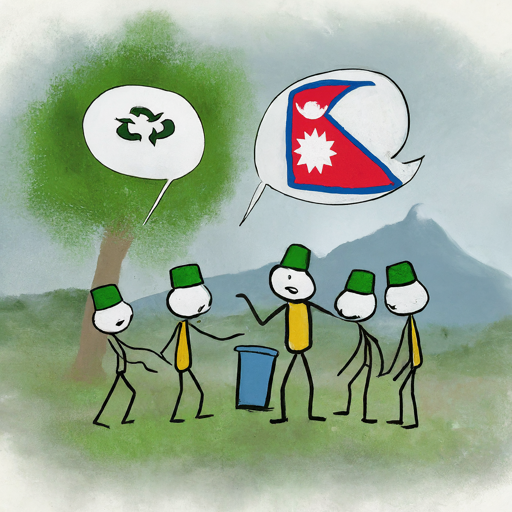Using student driven awareness and cleanliness campaigns to improving public hygeine and sanitation in Kathmandu valley

Estimated reading time: 4 minutes
Kathmandu and Lalitpur, the colorful and loud heart of Nepal, face a critical challenge: inadequate public hygiene. Littering, improper waste disposal, and a lack of community ownership contribute to unsanitary conditions, impacting public health, environmental well-being, and the overall quality of life. This proposal outlines a unique and innovative program that tackles these issues by supporting a sense of community responsibility, leveraging the enthusiasm of students, and creating economic incentives for responsible waste management practices.
The Problem
Public hygiene data paints a concerning picture. A 2023 study by the Kathmandu Valley Development Authority revealed a staggering 400 tons of waste generated daily, with only 70% reaching proper disposal facilities. Littering rates are high, particularly in residential areas, leading to clogged drains, stagnant water, and breeding grounds for disease-carrying insects. This not only creates potential health risks but also detracts from the city’s aesthetic appeal, impacting tourism and overall economic development.
Beyond the data, cultural nuances play a role. While Nepalis prioritize cleanliness within their homes, the collective responsibility for public spaces is less ingrained. This, coupled with the transient nature of some residents who originate from other parts of the country, weakens the sense of community ownership required for sustained improvements.
Our Solution: A Two-Pronged Approach
This program proposes a two-pronged approach to address these challenges:
1. Student-Led Monitoring and Competition:
-
Schools within Kathmandu and Lalitpur will be selected to participate in a year-long competition focused on improving public cleanliness in their designated neighborhoods.
-
Students, guided by teachers and community leaders, will receive training on waste management practices, effective communication, and leadership skills.
-
Each school will be assigned a specific neighborhood sector to monitor daily. Students will document litter levels, identify areas needing improvement, and track their progress.
-
A scoring system based on cleanliness metrics, community involvement activities, and educational initiatives will determine the winning school.
2. Incentivized Waste Separation:
-
To encourage responsible waste management at the household level, the program will introduce a system of token rewards for proper waste separation.
-
Residents will be provided with designated bins for compostable and non-compostable waste. Community waste collectors will be trained to identify and collect separated waste streams.
-
Households consistently showing effective separation practices will receive tokens redeemable for small gifts or discounts at local businesses.
A Collaborative Spirit
Community engagement is central to the program’s success. We will:
-
Partner with local businesses by assigning them responsibility for the cleanliness of their surrounding areas and encouraging them to promote proper waste disposal practices among their customers.
-
Organize community clean-up drives and awareness campaigns, involving residents, students, and local organizations.
-
Establish open communication channels to address concerns, gather feedback, and ensure the program remains culturally sensitive and responsive to community needs.
Building a Sustainable Future
The program’s long-term sustainability is crucial. We plan to:
-
Integrate core program elements into the school curriculum, ensuring continuity beyond the initial competition phase.
-
Partner with NGOs and government agencies to secure funding and expand the program to include other neighborhoods and municipalities.
-
Track and report program outcomes transparently, showing its positive impact on public hygiene, waste management, and community involvement.
Evaluation and Measurement
The program’s effectiveness will be measured through:
-
Regular monitoring of litter levels and waste composition in participating neighborhoods.
-
Surveys assessing residents’ perceptions of cleanliness and their participation in waste separation practices.
-
Tracking the number of participating schools, students, and community members involved in different activities.
-
Analyzing the impact on public health indicators such as respiratory illnesses and waterborne diseases.
Conclusion
This program offers a unique and sustainable approach to improving public hygiene in Kathmandu and Lalitpur. By engaging students, incentivizing responsible behavior, and creating a collaborative spirit, we can create cleaner, healthier communities. We urge local governments, businesses, and community members to join us in this initiative. By investing in this program, we invest in the future of our city and the well-being of its residents.
